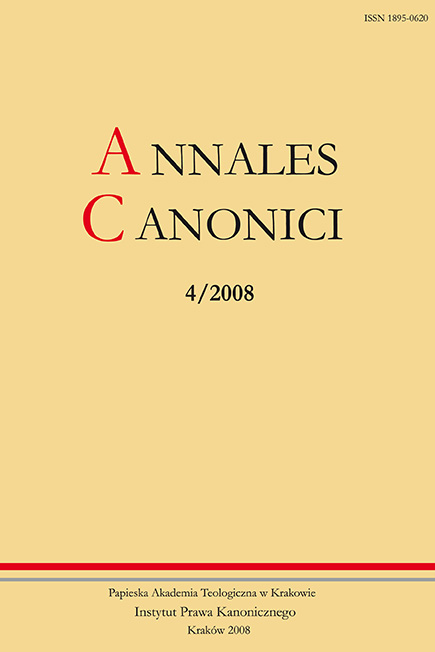Wpływ mentalności wolnych związków na ważność zgody małżeńskiej
DOI:
https://doi.org/10.15633/ac.0401Abstrakt
Nowadays marriage, as an institution, finds itself in a serious crisis. In modern societies, there exists a widely spread mentality – that is, not simply a view but rather a life action reflected in an outlook - which supports the free union relationships (that is, living as a couple without any legal formalization). This free union mentality must be a reason for concern as it has both theoretical and practical consequences. The present article aims to analyze the phenomenon of free unions and investigate its possible repercussions in canon law. The key question is whether a person who perceives free union, and not marriage, as a form of life of two heterosexual people can enter a valid marriage – that between the baptized – which by that fact is a sacrament. This problem could be further reduced to a question: how does the lack of faith influence the validity of sacramental marriage? Here we enter a discussion about the validity of sacraments received by persons who have been baptized but are now non-believers (they have lost their faith). In tribunal practice, the annulment matrimonial cases are judged by calling canons about the error concerning the unity or indissolubility or sacramental dignity of marriage (can.1099) or simulation (can. 1101 §1). The author presents pros and cons of such solution, basing his answers on wide literature. Although many answers have been given by the Magisterium as well as canonical and theological experts, the issue continues to be disputed. Since the existing problems and questions do not lead to a simple solution, they must be further elaborated and deepened.
Pobrania
Opublikowane
Numer
Dział
Licencja
Prawa autorskie (c) 2008 Remigiusz Sobański

Utwór dostępny jest na licencji Creative Commons Uznanie autorstwa 4.0 Międzynarodowe.
Autorzy publikujący w czasopiśmie udzielają jego wydawcy zgody o następującej treści:
- Autor zachowuje autorskie prawa majątkowe do utworu, a jednocześnie udziela wydawcy czasopisma zgody na jego pierwszą publikację w wersji drukowanej i wersji online na licencji Creative Commons Uznanie autorstwa 4.0 Międzynarodowe oraz zgody na wykonywanie opracowań, w tym przekładów.
- Autor ma możliwość udzielania zgody niewyłącznej na opublikowanie utworu w wersji, która ukazała się w czasopiśmie (np. zamieszczenia go w repozytorium instytucjonalnym lub opublikowania w książce), wraz z informacją o jego pierwszej publikacji w czasopiśmie.
- Autor może umieścić swój utwór online (np. w repozytorium instytucjonalnym lub na swojej stronie internetowej) jeszcze przed zgłoszeniem utworu do czasopisma.

